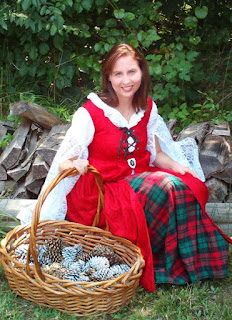When I read The Shape of Mercy by Susan Meissner I became extremely curious to learn more about the Salem witch trials, which I had never heard much about.
It started in June of 1692 and lasted through September. Nineteen people were led up Gallow's Hill and died by hanging, another 5 died in jail, a many more were accused yet never pursued. Another elderly man was pressed to death under stones for not submitting to be tried under the accusation of witchcraft.
Many wonder why this historical event ever took place. It was an unfortunate combination of congregational discord, economic difficulties, teenage boredom, and personal jealousies that made for the accusations, trials, and executions that occurred in the spring and summer of 1692.
The first three people arrest were Tituba, Sarah Good, and Sarah Osborn. Tituba was an Indian slave in the house of Samuel Parris. When young Betty Parris became strangely ill in February or 1692, complaining of fever, dashing around, and contorting in pain, the people naturally became worried about what the problem was. Witchcraft was never suspected until three other girls took on a similar illness. When the doctor couldn't cure them with his own medicines, he suggested that it might be possible that the illness came about supernaturally. With an Indian war happening less than seventy miles away, it was easy to believe such a thought. The real cause of their symptoms may have been some mixture of stress, abuse, asthma, guilt, boredom, epilepsy, etc. But with more children taking on such symptoms, the people of the village became more and more suspicious of witchcraft. Someone told Tituba to bake a rye cake with the urine of Betty Parris and feed the cake to a do. ( Dogs were believed to be used by witches as agents to carry out their devilish commands.) Tituba, who was already known to tell the girls tales of witchcraft from her native folklore, became a serious suspect when it was found out that she baked the rye cake. She was arrested on February 29th along with two other women; Sarah Good and Sarah Osborn.
And thus began the Salem Witch Trials. Tituba, Sarah Good, and Sarah Osborn were scheduled to be tried on March 1st. During the trial, Tituba confessed she was, indeed, a witch along with four other women who had been visited by a tall man who often appeared as a hog or dog(the Devil) and asked to sign his book and do his work. She even proclaimed that they had rode in on poles. The fear of the gallows was enough to make many people confess, very possibly falsely, to being witches, and they were not hung if they were.
And so progressed the trials. More and more accusations made, more and more children and teenagers becoming "afflicted" by the so accused "witches".
By early autumn of 1692, the trials were coming to an end. Doubt that so many respectable people could be guilty was forming. Increase Marther stated that it "were better that ten suspected witches should escape than one innocent person should be condemned.". A regarded Boston minister named Samuel Willard circulated Some Miscellany Observations, which suggested that the Devil might create the specter of an innocent person. Eventually, in May of 1693, Governor Phips, who had taken Marther and Willard's works, set the remaining jailed accused free and pardoned the three already accused witches.








